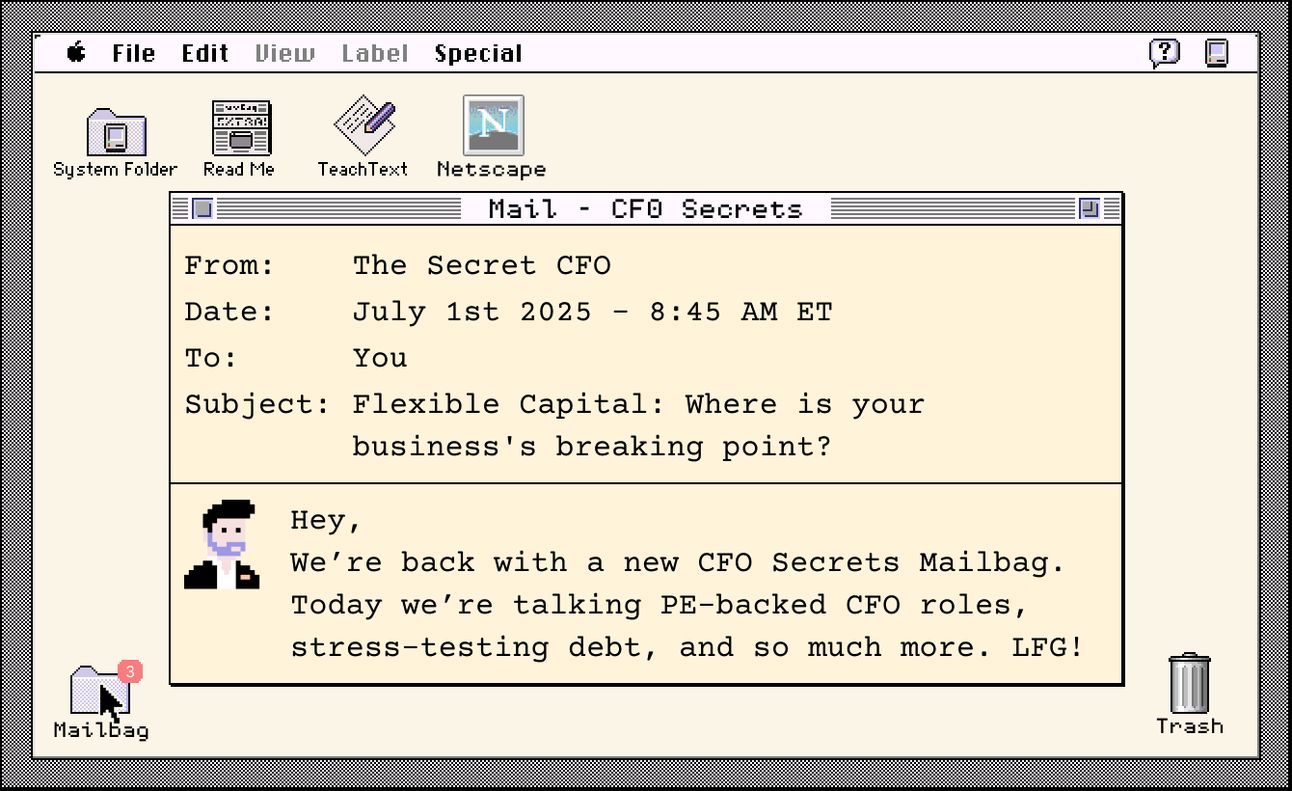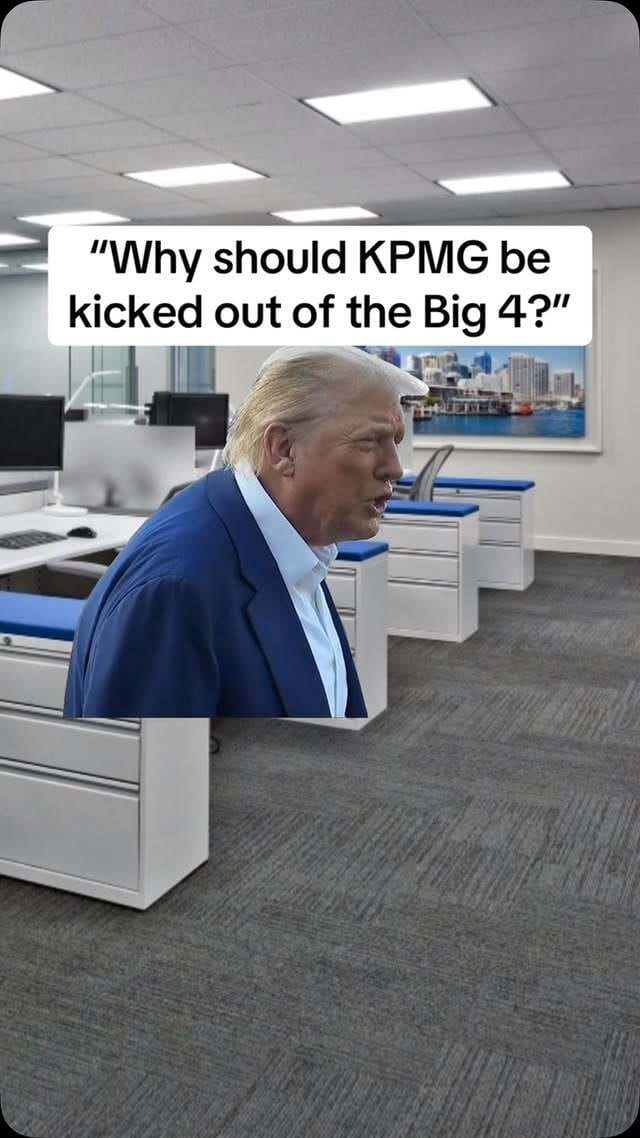

Ever feel your CFO brain has too many tabs open? Close the chaos—open a mindmap.
Our webinar on CFO Mindmaps breaks down everything today’s finance leaders juggle: financial planning, AI strategy, ESG reporting, risk management, treasury & more.
Walk away with a visual framework to map your entire CFO strategy - and turn complexity into clarity.


Frodo from Charlotte, NC asked:
What makes a "great" CFO? How does the answer vary based on your background: a "traditional" CFO (e.g., CPA, came up through accounting/finance) vs. "strategic" (e.g., came from banking, legal, etc. background)? How does this vary from large corporate/public CFOs vs. smaller companies or private equity-backed companies?

Frodo,
Being strategic isn’t about your background; it’s about how you think. Sure, some backgrounds give you more ‘strategic’ reps early on. But I’ve met some incredibly short-termist investment bankers, and some very strategic CPAs. So your resume doesn't determine your ceiling.
I don’t think what makes a great CFO depends on whether you came up through accounting or banking, legal, or consulting. It varies a bit depending on your environment - SMB, PE-backed, VC-fueled, or big public company - but not as much as people think. 90% of the DNA is the same.
Here’s what it takes:
5 Crucial CFO Skills
Radical Independence
You’ve got to form your own judgments based ruthlessly on the facts. Be aware of your biases. And be right more than wrong. If you’re the one saying no, it better be the right no. And when you say yes, you better not regret it.
Outstanding Leadership
As an exec, your value isn’t what you do. It’s what you enable others to do. You’re judged by the output of your team and the business. So your ability to lead, influence, and raise the game around you is everything.
Commerciality
This means connecting the business to the numbers and making good calls. You need to understand both the economics of the business and the story behind them. Everyone thinks they are good at this, most aren’t.
Attention to Detial*
No matter how big the business or how senior the title, finance people do not get to outsource an eye for detail. Too many believe they can grow out of it. You won’t. And if you do, you’ll be a terrible CFO.
*Yes, that was deliberate. Don’t flood my inbox. Calm down.
Number One Energy
The room needs to believe you’ve got it. Town halls. M&A. Investor meetings. IPOs. When it’s your turn, people need to think: “She’s in control.” Some are born with it. Others build it. But it matters in those most high-stakes moments.
If you want to go deeper, I wrote more about this here: CFO Leadership Skills


Ken from Canada asked:
What's critical to get right as a private equity-backed CFO vs. a corporate one? A private-equity backed CFO will likely have a much smaller staff and very different demands. It's less about navigating large boardrooms and multi-department budgets and more about using data to drive accelerated growth and M&A.
What are best practices for doing that?

You’re right to call out the distinction, but let’s frame it properly.
In private equity, the CFO is the lead operator in a high-stakes, time-boxed value creation plan. Less politics. More pressure. Nowhere to hide.
I don’t think size is the key criterion. There are plenty of Private Equity CFO roles that are larger and more complex than so-called corporate CFO jobs.
Likewise, there are very acquisitive corporate CFO roles. And the value of FP&A-led insight comes from the strategy and the data quality, not the capital structure.
But you’ve hit on the right distinction: stakeholder complexity. One of the big advantages of a PE-backed environment is that you don’t have the theater of managing multiple disconnected stakeholders. Shared ownership and streamlined governance mean interests are more aligned.
In a PE-backed setting, the capital structure and ownership model create alignment. Fewer stakeholders, clearer incentives, and rapid decision-making mean you spend less time building consensus and more time driving results.
PE-backed CFO roles tend to be more operationally intense than they are strategically intense. The strategic calls, like long-term capital structure and exit planning, are usually handled by the PE fund. So the CFO is a high-impact operator.
You are expected to drive cash flow improvement fast. That means tight control of working capital, aggressive cost optimization, and commercial rigor.
The best PE CFOs are deeply commercial and execution-focused, but also self-aware enough to stay in their lane when it comes to long-term fund strategy.
You’ll almost certainly carry a high level of debt. So even with strong EBITDA, covenant compliance and interest coverage matter. Forecasting isn’t about hitting targets, it’s crucial to avoid running out of cash or breaching covenants.
M&A is often a big part of the value creation playbook. And here’s where a great PE CFO earns their stripes:
You run diligence like a forensic accountant
You model synergies like an FP&A lead
You integrate like an ops leader
You manage post-deal performance like a deal sponsor
Being an operator who understands the CFO role and business from first principles is crucial. It’s true that in the corporate world, there are a bunch of senior finance leaders who are good at managing inside a framework that the corporate world or their business provides to them. Then remove those guardrails, and they’d be a deer in headlights. But it’s also true, that there are plenty in the corporate environment, who’d be just fine without those guardrails too.
In PE, you operate without a safety net. No corporate scaffolding. You win by being fast, decisive, and accountable. Those qualities are great in the corporate world too, but in PE it’s a matter of survival.
I do have a series coming on CFOing in a PE-backed environment later in the year. Keep an eye out.


Paul G. from London, UK asked:
We are sizing up various debt options, and there is a fair degree of variation between them. Our model is relatively straightforward to forecast, but we are growing rapidly by the same token. At one end of the debt spectrum is something that is expensive and ultra-flexible. At the other end is something that is pretty cheap but with covenants. How would you approach the decision-making process here?

So, Paul, the key question here is how much flexibility do you need? Because you’re seeing first-hand what every CFO faces eventually: a flexible capital structure is expensive.
Finding cheap capital when the business needs it is an atomic duty of the CFO. But it only works if you can live within the constraints that come with it. Flexibility is valuable, but don’t pay for it if you don’t need it.
This is where your long-range planning model needs to earn its keep. Not to validate your base case, but to pressure test the edge cases.
Stress test your plan against the covenants. Break the model. What would need to go wrong or right for you to breach them? Where’s the breakpoint? What do those operational assumptions look like in the business at the breakpoint?
Then ask yourself (and your exec team): how likely is that? 1%, 5%, 40%? That answer will tell you how restrictive the covenants really are.
And in your case, pay particular attention to growth rate sensitivity. Everyone models downside risk. But what if you grow faster than expected? Working capital and capex can run away from you quickly.
You do not want covenants that accidentally cap your growth. That risk is higher when the top line is moving fast. The ratios that worked at $10M revenue might not work at $30M.
You do not want to have to ask your bank’s permission to grow. That’s not a good look for finance.
So, back to your question: you have to figure out what that flexibility premium is worth. If it’s flexibility you’re very unlikely to need, take the cheap capital. But if your business is moving fast or your plan has high volatility, that optionality might be worth paying for.
And don’t forget, the world moves quickly, too. Disruptive macro events often come from left field. Edge cases are more common than we like to admit.
Thanks for the question, Paul.

A few of the biggest stories that every CFO is paying close attention to. This is the section you probably don’t want to see your name in.
It appears that Zuck isn’t the only one poaching talent. Google just stole its new cloud CFO from Oracle. This one probably stings a bit more for Larry Ellison, considering the head of Google’s cloud biz defected from Oracle after a falling out.
Inflation is hitting corruption, too, I guess. Nigerian authorities arrested the former CFO (and others) of its state oil company, accusing them of a $7.2 billion diversion of funds.
Nothing raises red flags quite like the CFO of a publicly traded company stepping down suddenly after just about a year on the job.

ICYMI, here are some of my favorite finance/business social media posts from this week. In the words of Kendall Roy, “all bangers, all the time.”:

If you’re looking to sponsor CFO Secrets Newsletter, fill out this form, and we’ll be in touch.
Find amazing accounting talent in places like the Philippines and Latin America in partnership with OnlyExperts (20% off for CFO Secrets readers)
If you enjoyed today’s content, don’t forget to subscribe.
Let me know what you thought of today’s Mailbag. Just hit reply… I read every message.
In Saturday’s newsletter, we got into the ethical tightrope a CFO walks every single day. Check it out now.


Disclaimer: I am not your accountant, tax advisor, lawyer, CFO, director, or friend. Well, maybe I’m your friend, but I am not any of those other things. Everything I publish represents my opinions only, not advice. Running the finances for a company is serious business, and you should take the proper advice you need.


